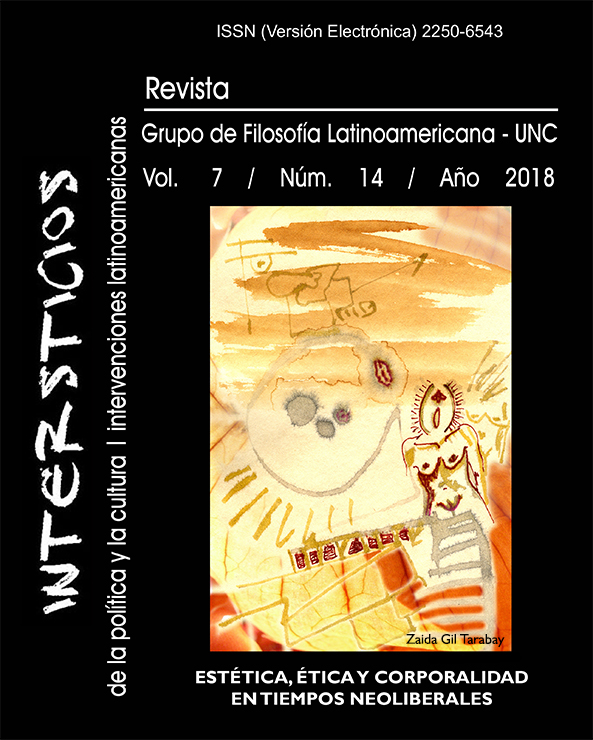Historical productivity, institutional heterogeneity and power dynamics. Rethinking the State from the Argentinian case.
Keywords:
political subjectivation, political power, state, marketAbstract
This paper offers some hypotheses to problematize and open the discussion about the political theoretical coordinates that allow us to approach the problem of the State in Nuestra America.
Specifically, we emphasize three points:
a- The historical productivity of the Latin American States. Here we follow the contributions did by Martín Cortés in his reflection on the “leviatán criollo”.
b- The intrinsic heterogeneity of contemporary state formations. In that point we offer a re-reading of Laclau's use of the concepts of sedimentation-reactivation to think politics.
c- The state apparatus and the market as instances of power’s condensation. Totalization and reinsurance instances of the multiple institutions that organize the social life, its productive and reproductive dynamics. Here we re-read Foucault's distinction between the old sovereign power to kill and the biopolitical power to let die. We do that in light of the Hinkelammert's theory about the power dynamics of state and market.
These three ideas allow us to open a debate in the field of contemporary political theory about the relevance to reformulate the concept of the state and, at once, to propose some hypotheses about it. The reformulation proposed help us to construct an effective conceptual instruments to map with greater precision the topography of forces in which popular Latin American struggles take place.
Downloads
References
Aricó, J. (1982) Marx y América Latina. México: Alianza.
Beasley-Murray, J. (2010) Poshegemonía. Teoría Política y América Latina. Buenos Aires, Paidós.
Cortés, M. (2012) “El Leviatán criollo. Elementos para el análisis de la especificidad del Estado en América Latina”; En Thwaites Rey, M. (compiladora) El Estado en América Latina: continuidades y rupturas (93-115). Santiago de Chile, Editorial Arcis-CLACSO.
Cuervo Sola, M. (2013) “La unidad geopolítica de la Cuenca del Plata en la constitución del Estado-Nación argentino” en S. Astorga; D. Alonso; A. Montaldi, Actas de las III Jornadas Internacionales de problemas latinoamericanos. “Movimientos sociales, estados y partidos políticos en América Latina: (Re)configuraciones institucionales, experiencias de organización y resistencia. Guaymallén: Qellqasqa. CD-ROM. ISBN 978-987-9441-65-7
Cuervo Sola, M. (2017) “Entre el hacer vivir y el dejar morir mercantil; el dejar vivir y el hacer morir estatal: hipótesis hinkelammertiana respecto al modo en que trabaja el poder sobre la vida humana en las formaciones estatales contemporáneas”. En Hinkelammert, F. (editor) La religión neoliberal del mercado y los derechos humanos. San José de Costa Rica, Arlekin-Luxemburg Stiftung.
Deleuze, G. (2005) “Posdata sobre las sociedades de control”. En C. Ferrer (compilador) El lenguaje libertario. Antología del pensamiento anarquista contemporáneo. La Plata: Terramar.
Fernández Nadal, E. (2006) “Acerca de fetiches, ídolos y utopías: Hinkelammert y la racionalidad abstracta del capital”. En E. Fernández & J. Vergara (editores), Racionalidad, utopía y modernidad. El pensamiento crítico de Franz Hinkelammert. Santiago: Editorial Universidad Bolivariana;
Fernández Nadal, E. (2016) “El ser humano: infinitud atravesada por la finitud. La dimensión vida-muerte en el pensamiento de Franz Hinkelammert”. En Pelícano. Revista de Filosofía y Humanidades, Vol.2, agosto 2016. 22-32. Córdoba: Universidad Católica de Córdoba. Recuperado denhttp://revistas.bibdigital.uccor.edu.ar/index.php/pelicano/article/view/1118.
Foucault, M. (2010) Defender la sociedad; Buenos Aires: FCE.
Hinkelammert, F. (2007) Hacia una crítica de la razón mítica. El laberinto de la modernidad. Materiales para la discusión. San José: Arlekin.
Kaplan, M. (1981) Aspectos del Estado en América Latina. México: UNAM.
Laclau, E. (1990) Nuevas reflexiones sobre la revolución de nuestro tiempo. Buenos Aires: Nueva Visión.
Laclau, E. & Butler, J. (2008) “Los usos de la igualdad” en S. Critchley & O. Marchart (compiladores) Laclau. Aproximaciones críticas a su obra. Buenos Aires: FCE.
Laguado, A. (2007) “El pensamiento liberal en la construcción del Estado nacional argentino”. En González, J. E. (editor) Nación y nacionalismo en América Latina. Bogotá: Universidad Nacional de Colombia. Centro de Estudios Sociales -CLACSO.
Svampa, M. (2013) "Consenso de las commodities, neoextractivismo y pensamiento crítico en América Latina". Conferencia pronunciada en las I Jornadas de Sociología. La Sociología frente a los nuevos paradigmas en la construcción social y política: Mendoza, Argentina y América Latina en el despunte del siglo XXI: interrogantes y desafíos que se realizaron los días 9 y 10 de mayo en la FCPyS-UNCuyo. Dirección URL del evento: http://bdigital.uncu.edu.ar/8295.
Torres Rivas, E. (1981) “La nación: problemas teóricos e históricos” en N. Lechner (editor) Estado y política en América Latina. México: Siglo XXI editores.
Viñas, D. (2014) De los montoneros a los anarquistas. Buenos Aires, Santiago Arcos.
Thwaites Rey, M. & Ouviña, H. (2012) “La estatalidad latinoamericana revisitada. Reflexiones e hipótesis alrededor del problema del poder político y las transiciones”, en M. Thwaites Rey (compiladora) El Estado en América Latina: continuidades y rupturas. Santiago de Chile: Editorial ARCIS -CLACSO.
Zavaleta Mercado, R. (1984) “El Estado en América Latina”, en El Estado en América Latina. La Paz: Los Amigos del Libro.
Downloads
Published
Issue
Section
License
Authors who have publications with this journal agree to the following terms:
a. Authors will retain their copyright and grant the journal the right of first publication of their work, which will simultaneously be subject to the Creative Commons Attribution License that allows third parties to share the work as long as its author and first publication in this journal are indicated.
b. Authors may adopt other non-exclusive license agreements for distribution of the published version of the work (e.g., deposit it in an institutional telematic archive or publish it in a monographic volume) as long as the initial publication in this journal is indicated.
c. Authors are allowed and encouraged to disseminate their work through the Internet (e.g., in institutional telematic archives or on their web page) after the publication process, which may produce interesting exchanges and increase citations of the published work (see The effect of open access).


